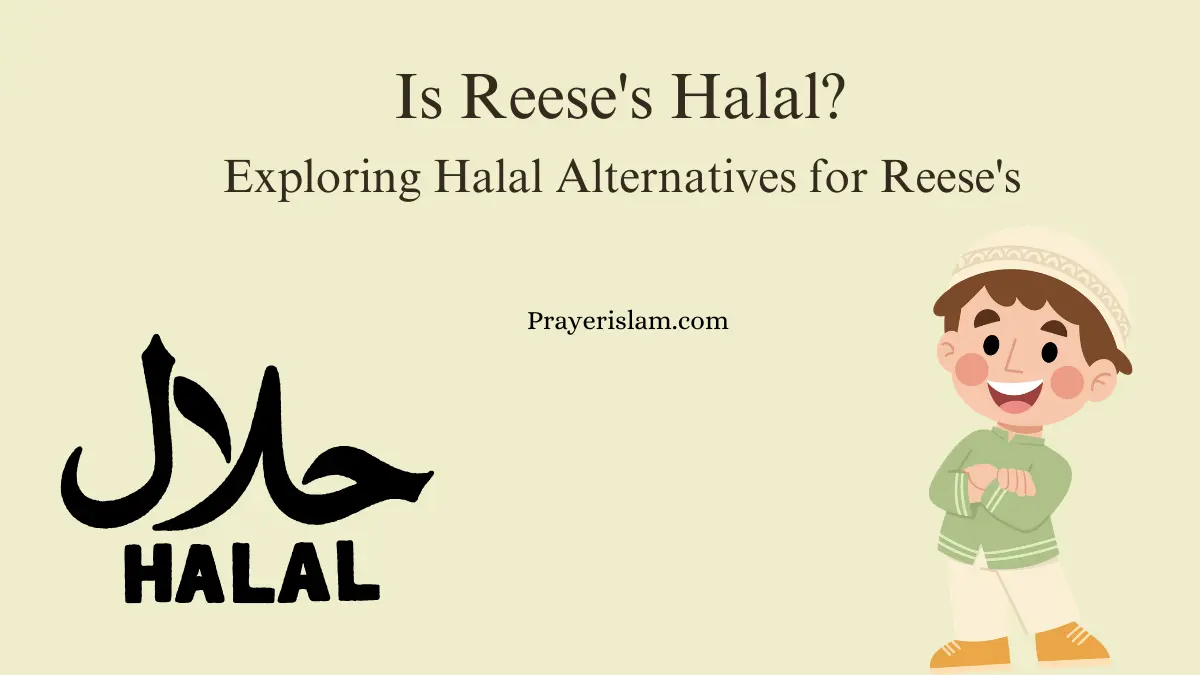Reese’s, the iconic peanut butter and chocolate treat, has been a favorite for decades. With its perfect blend of sweet and salty, it’s no wonder it’s a go-to snack for many. However, for those following a halal diet, a pressing question arises: Is Reese’s halal? In this comprehensive guide, we will explore whether Reese’s is permissible in Islam, discuss potential concerns, and offer halal alternatives for those who want to enjoy similar flavors without compromising their beliefs.
1. What Does Halal Mean?
Before diving into the specifics of Reese’s, it’s crucial to understand what halal means. Halal is an Arabic term meaning “permissible” and refers to what is allowed under Islamic law. This applies not only to food but also to all aspects of life. When it comes to food, halal means that the product is free from any forbidden (haram) ingredients and is prepared in a manner that adheres to Islamic guidelines.
Ingredients in Reese’s: Are They Halal?
To determine whether Reese’s is halal, we need to look at its ingredients. The main ingredients in Reese’s Peanut Butter Cups typically include:
- Milk Chocolate (sugar, cocoa butter, chocolate, nonfat milk, milk fat, lactose, lecithin, PGPR)
- Peanuts
- Sugar
- Dextrose
- Salt
- TBHQ and Citric Acid (as preservatives)
At first glance, these ingredients may not seem problematic. However, the source of certain ingredients like lecithin, emulsifiers, and flavorings can raise concerns. For instance, lecithin can be derived from soy or eggs, and if eggs are used, they must be halal. Additionally, some additives and flavorings may contain alcohol or other haram substances.
The Halal Status of Reese’s: A Closer Look
The halal status of Reese’s varies depending on the country of production and the specific product line. In some countries, Reese’s products may be certified halal, meaning they meet the strict requirements of Islamic law. However, in other regions, the absence of halal certification means that there’s uncertainty about the permissibility of the ingredients and production process.
How to Determine if Reese’s is Halal
For those concerned about whether Reese’s is halal, it’s important to check for certification on the packaging. If the product is certified by a reputable halal certification body, you can be confident that it meets Islamic dietary standards. However, if there is no certification, it’s advisable to contact the manufacturer directly or consult a knowledgeable religious authority.
Read More:
Halal Alternatives to Reese’s
If you’re looking for a halal alternative to Reese’s, there are several options available that offer a similar taste experience:
- Halal-Certified Peanut Butter Cups: Several brands offer peanut butter cups that are certified halal, providing the same delicious combination of chocolate and peanut butter without any concerns.
- Homemade Peanut Butter Cups: Making your own peanut butter cups at home ensures that you control the ingredients. Use halal-certified chocolate and peanut butter to create a treat that’s both delicious and permissible.
- Other Allowed Chocolates: There are many certified chocolate brands that offer similar products to Reese’s. These can often be found in specialty halal stores or online.
Nutritional Comparison: Reese’s vs. Halal Alternatives
Reese’s Peanut Butter Cups are known for their high sugar and fat content, making them an indulgent treat. When looking at halal alternatives, especially homemade options, you have the opportunity to control the sugar and fat levels, making for a potentially healthier snack. Some halal-certified brands also offer versions with lower sugar or dark chocolate, catering to those looking for a more health-conscious option.
Ethical Considerations in Choosing Halal Alternatives
Choosing halal alternatives to Reese’s not only ensures adherence to Islamic dietary laws but also often involves ethical considerations. Many halal-certified products are produced with a focus on ethical sourcing, fair trade, and humane treatment of animals. This aligns with broader Islamic principles of fairness and respect for creation.
Where to Buy Halal Alternatives to Reese’s
Finding halal alternatives to Reese’s is becoming increasingly easier with the growth of certified products. Here’s where you can look:
- Halal Supermarkets: Many halal supermarkets carry a range of halal-certified chocolates, including peanut butter cups.
- Online Retailers: Websites specializing in Allowed products offer a wide variety of options, including chocolates similar to Reese’s.
- Health Food Stores: Some health food stores carry brands that, while not specifically halal, offer products that meet halal dietary requirements due to their clean, simple ingredients.
DIY Recipe: Making Your Own Halal Peanut Butter Cups
One of the best ways to ensure your peanut butter cups are halal is to make them yourself. Here’s a simple recipe:
Ingredients:
- 200g halal-certified dark or milk chocolate
- 100g halal-certified peanut butter
- 2 tablespoons powdered sugar
- 1 tablespoon butter (optional, ensure it’s halal-certified)
Instructions:
- Melt the chocolate in a double boiler or microwave.
- In a separate bowl, mix the peanut butter with powdered sugar and butter until smooth.
- Pour a small amount of melted chocolate into each mold (or muffin tin lined with paper cups).
- Add a dollop of the peanut butter mixture on top of the chocolate layer.
- Cover with another layer of melted chocolate.
- Refrigerate until solidified, then enjoy your homemade halal peanut butter cups!
FAQs about Reese’s and Halal Alternatives
Q: Is Reese’s halal in the United States?
A: Reese’s products in the U.S. are generally not halal-certified. It’s recommended to check the packaging or contact the manufacturer for specific information.
Q: What makes Reese’s potentially haram?
A: The potential issues include non-halal lecithin, flavorings, and the possibility of cross-contamination with non-halal ingredients during production.
Q: Can I find halal Reese’s in other countries?
A: In some countries, Reese’s products may be halal-certified, but this varies by region. Always check for certification.
Q: Are there vegan alternatives to Reese’s that are also Allowed?
A: Yes, there are vegan and halal alternatives available, often found in health food stores or online.
Q: What are some popular brands offering halal peanut butter cups?
A: Some halal-certified brands include Al Ameera, Zainab’s, and Tazah, which offer similar products to Reese’s.
Conclusion
While Reese’s may not always be halal, there are plenty of alternatives available for those who follow Islamic dietary laws. Whether you opt for halal-certified brands, make your own at home, or explore other halal-friendly treats, you can enjoy the beloved combination of peanut butter and chocolate without compromising your beliefs. Always ensure to check for halal certification and choose products that align with your values and dietary needs.

